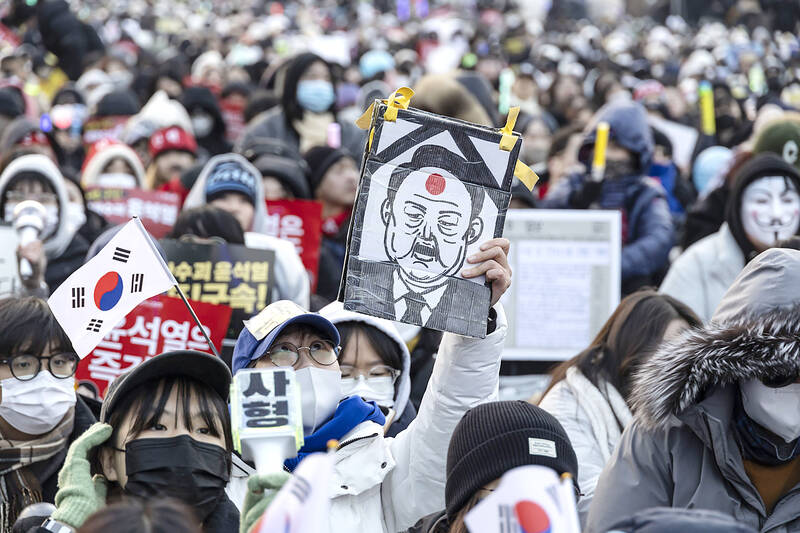South Korea’s consumer confidence this month dropped by the most since the outbreak of the COVID-19 pandemic, battered by the political turmoil triggered by President Yoon Suk-yeol’s declaration of martial law and his impeachment.
The composite consumer sentiment index slipped 12.3 points to 88.4 this month, falling well below the threshold of 100 that divides optimism and pessimism, a Bank of Korea (BOK) survey released yesterday showed.
That is the biggest slide since the WHO declared the pandemic in March 2020, sending global consumer sentiment tanking.

Photo:Bloomberg
Yoon declared martial law on Dec. 3 in a move that rattled financial markets from stocks to currencies, prompting the BOK and government to pledge “unlimited liquidity” if necessary.
Greater political uncertainty and financial volatility are the main factors that dented confidence among South Koreans, the BOK said in the survey conducted from Dec. 10 to Tuesday last week.
While Yoon retracted his decree within hours, parliament punished him on Dec. 14 by approving an impeachment motion that the South Korean Constitutional Court would deliberate. Yoon remains suspended from power, with South Korean Prime Minister Han Duck-soo serving as his stand-in.
The latest survey shows how the events have impacted consumer sentiment, raising concerns about a further slowdown in private spending.
Sentiment about the economy plunged 18 points from a month earlier while the outlook for the next half year dropped by the same margin, the survey showed.
The outlook for consumer spending dipped 7 points while the prospect for home prices fell 6 points.
Speculation is increasing among economists that the BOK might consider a rate cut next month to respond to the headwinds rising for the economy as the political uncertainty rumbles on.
The bank conducted back-to-back cuts in October and last month as it sought to brace the export-reliant economy for the potential impact of US president-elect Donald Trump’s return to power and his tariff plans.

The Eurovision Song Contest has seen a surge in punter interest at the bookmakers, becoming a major betting event, experts said ahead of last night’s giant glamfest in Basel. “Eurovision has quietly become one of the biggest betting events of the year,” said Tomi Huttunen, senior manager of the Online Computer Finland (OCS) betting and casino platform. Betting sites have long been used to gauge which way voters might be leaning ahead of the world’s biggest televised live music event. However, bookmakers highlight a huge increase in engagement in recent years — and this year in particular. “We’ve already passed 2023’s total activity and

Nvidia Corp CEO Jensen Huang (黃仁勳) today announced that his company has selected "Beitou Shilin" in Taipei for its new Taiwan office, called Nvidia Constellation, putting an end to months of speculation. Industry sources have said that the tech giant has been eyeing the Beitou Shilin Science Park as the site of its new overseas headquarters, and speculated that the new headquarters would be built on two plots of land designated as "T17" and "T18," which span 3.89 hectares in the park. "I think it's time for us to reveal one of the largest products we've ever built," Huang said near the

China yesterday announced anti-dumping duties as high as 74.9 percent on imports of polyoxymethylene (POM) copolymers, a type of engineering plastic, from Taiwan, the US, the EU and Japan. The Chinese Ministry of Commerce’s findings conclude a probe launched in May last year, shortly after the US sharply increased tariffs on Chinese electric vehicles, computer chips and other imports. POM copolymers can partially replace metals such as copper and zinc, and have various applications, including in auto parts, electronics and medical equipment, the Chinese ministry has said. In January, it said initial investigations had determined that dumping was taking place, and implemented preliminary

Intel Corp yesterday reinforced its determination to strengthen its partnerships with Taiwan’s ecosystem partners including original-electronic-manufacturing (OEM) companies such as Hon Hai Precision Industry Co (鴻海精密) and chipmaker United Microelectronics Corp (UMC, 聯電). “Tonight marks a new beginning. We renew our new partnership with Taiwan ecosystem,” Intel new chief executive officer Tan Lip-bu (陳立武) said at a dinner with representatives from the company’s local partners, celebrating the 40th anniversary of the US chip giant’s presence in Taiwan. Tan took the reins at Intel six weeks ago aiming to reform the chipmaker and revive its past glory. This is the first time Tan